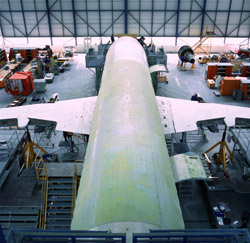Simplified forming of difficult materials
Conventional sheet metal processing methods are time and energy intensive, particularly for hard materials like Ti alloys and complex parts. Further, manufacture requires dedicated tooling. Development of technology based on asymmetric incremental sheet forming within the EU-supported project 'Innovative manufacturing of complex Ti sheet components' (INMA)(opens in new window) will facilitate production of complex metal parts without dedicated tooling. The savings in time, energy and cost together with the added flexibility will significantly strengthen the competitive position of the EU aerospace industry. Asymmetric incremental sheet forming is a relatively new computerised processing technique based on an older localised deformation processing method. A computer numerical control-driven tool forms the asymmetric sheet metal part in a stepwise fashion without the need for costly supporting dies. Thus, the final part is produced from a series of localised deformations. Scientists focused on the Ti alloy Ti6Al-4V. Experimental activities to determine processing parameters were supported by finite element modelling to simulate hot and cold forming of large and complex shapes. After characterising the deformed alloys and applying advanced data mining techniques, researchers optimised the tool path to reduce distortion and increase geometrical accuracy. Two technology demonstrators showcased the benefits of this innovative technology. The team employed Inconel 718, a nickel-chromium-iron alloy, to produce a strut half with cold forming. A strut is a shock-absorbing bar supporting the wing or landing gear of an aircraft. Ti6Al-4V was used to produce two generic shapes similar to pylon fairings, aerodynamic covers over the pylon that attaches the engine to the wing or fuselage. The Ti was formed with a hot die-less forming process. Preliminary evaluation confirmed good geometric accuracy and overall quality of the parts, putting the technology on the road to commercialisation. INMA has made an important contribution to knowledge-based flexible manufacturing through process development and materials characterisation for difficult-to-form sheet metal. This technology has the potential to revolutionise sheet metal forming and INMA has made sure the EU aerospace sector will be among the first to benefit from industrialisation.







